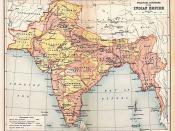The British first entered India when it was under the Mughal rule in the late 1500's and the early 1600's. The Mughal rule was rising and so they openly welcomed these western traders. But by the 1700's, the Mughal rule declined and the British East India Company (BEIC) had established themselves in India and immediately started taking over the little kingdoms that had formed. By 1820 they had control of nearly half of India. They converted it into a colony and treated the people like their slaves. Due many negative effects of this imperialism the Indian public rebelled against the mightiest kingdom in the world of that time and successfully drove them out of their homeland. But the British did have some positive effect on India, although the negative effects outbalance the positive in its measure greatly.
When the British traders first arrived in India, the mighty Mughals did not feel threatened by them in anyway.
But in the early 1700's the Mughal Empire started to decline due the lack of leadership in the rulers and many other small reasons. India was divided in to hundreds of little kingdoms and here's when the British made their move. By 1700 the BEIC, who had established itself in India and was completely detached from the British government, had hired their own private armies of native Indian troop, called sepoys. Through the 1700's the British influence expanded in India, because of two reasons, the chaos in Indian politics and the efforts of enterprising traders. As mentioned before, by 1820 the BEIC had nearly half of India under its control. This phenomenon acquisition by the British under a century was a result of four reasons: superior technology, the chaos from 1740 to 1780 paved the way for British domination, the British were well organized...


